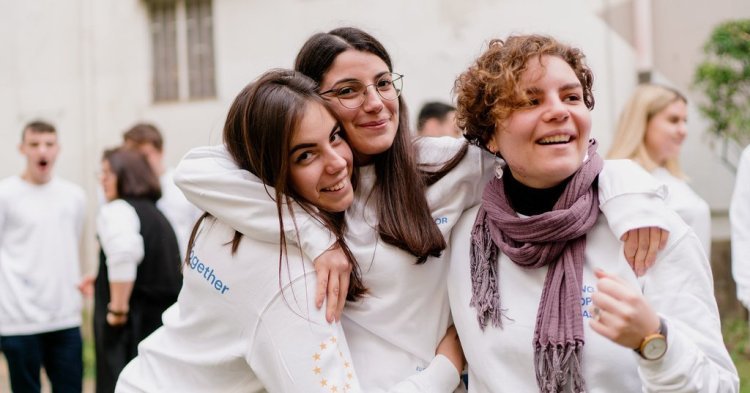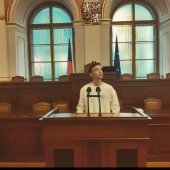So, Maria, what is the Eastern Partnership?
The Eastern Partnership is a project which was born by the will of the European Union, because it was recognised the strategical importance that some countries that are now in the partnership have for the EU. It is a joint initiative of the European External Action Service of the European Union (EU) together with the EU, its member states, and five Eastern European partners governing the EU’s relationship with the post-Soviet states of Armenia, Azerbaijan, Georgia, Moldova, and Ukraine. Throughout the years, the focus shifted. In the beginning, it was more focused in trade and the economic aspects, but with time it became a lot more related with change, about culture and also about sustainability. As we know sustainability has been more and more recognised and sustainable solutions are urgent for us to keep living on this planet. I would also even say that with the Russian aggression towards Europe, the cooperation between the five countries with the EU is becoming even stronger now.
What is the Young European Ambassadors (YEAs) initiative and what does a YEA do?
The YEAs initiative was created as a part of the communication project called EU NEIGHBOURS east. The aim of this project is to present the work of the EU inside the neighborhood. It is important to gather people in the EU who actually care about major issues affecting Europe and its neighbors. If our readers check our social media, they will notice that our motto is “Stronger Together” and it represents exactly what we stand for in this network. The union between the countries and the EU. As an organization, the YEA initiative is divided in seven chapters, one for each of the Eastern Partnership countries and one for the EU, which I represent. All the chapters work in a different way, but they all have the same objective, which is to promote the work of the EU, to raise awareness, not only about that same work itself, but also on matters that are very important for young people. We advocate for the needs and the rights of young people. What we do on a weekly base is mostly meetings, because in order to organise activities in different countries it is extremely important to stay connected. So, we meet, we have conferences, we stay connected so that we understand what we can do. We often draft and change strategies and then, depending on the availability, we organise activities, which can be of various types. We have a wonderful initiative – the Dialogue Initiative – in which we deepen and strengthen connections between EU countries and a country from the partnership at a time. But what we do really depends on the moment of the year and on what happens in the region and the world. For example, right now, we are focused on environment. Our strategies, although they always point to the same goal, change from time to time and I think that this is beautiful. We remain dynamic.
How are the Young European Ambassadors selected?
There is an open call and this year it will be in September. So, this is for the people who might be interested, remember, it´s in September. Write it down and then look it up. The process has changed over the years. The first thing we do now is gather the interested people, both from the EU and the partnership countries and then we divide it into committees where other more experienced Young European Ambassadors discuss the applications. We believe that people from the network will know better what the network needs. We see us as part of the initiative, growing every day with it and learning from all sides. So, after this first step, there is an interview, which is mainly focused on the motivation. After that, we discuss inside the network before the final decision.
So, Maria, what motivated you to be a part of this European project? How did you discover, how did you get involved?
My relationship with Europe in general started with my Erasmus exchange experience, in 2015. After that, I just started to look for other opportunities. I always had an interest in the Eastern region and all the people and cultures there. When I discovered this project, I decided to apply, and I just fell in love with it. It was basically the first opportunity I had in my life to get in touch with young people living in that region. To discover how they live, what they do, what are their inspirations and what motivated Young European Ambassadors there. But the change really happened when I was in Brussels before the pandemic. There, I discovered so much, and I truly understood how important to create a dialogue. I am still here, I absolutely love it, so I guess everything worked out.
How many YEAs are there from the EU right now and, more importantly, what have they done so far, especially over the last few months?
Now we are around 75 and one curious thing is that some ambassadors, even after their work is done, don´t really leave the network. They have a different way to contribute and they´re still a part of our initiative. I just want to specify that there´s no limit for the period you want to be in the initiative. So, let´s say, you can start when you are 18 and stay basically forever. But when new people join, between October and November, the activities and the dynamics also change because the network and its essence is made by the people who are a part of it. Since last October, what we did some activities, but everything changed when Russia invaded Ukraine. From that moment on, our activities shifted. We were profoundly shocked, and our priority was trying to understand how we could help our peers, our colleagues, our friends who were living the war. Between October and February, we participated in international meetings, events for young people, conferences and contributed to many initiatives of the European Commission, being the young people´s voice in some policies. From February on, we focused more on what we could do to support those suffering with this devastating war. And we started by showing solidarity, because in a first moment nobody was really understanding what was happening. It was really hard to find a stable project and we waited two weeks to see how everything was going to develop and we prepared a statement underlining how Russian´s aggression is unfair and unprovoked and how we want to show our solidarity with the Ukrainian people. We also organize events and dialogues with information for Ukrainians leaving the country to help them continue their studies, how they could do it, where, if someone could help them with the bureaucracy or host them for some nights. So, we started with this kind of support, which keeps going today. Right now, we are starting again to attend events in the European Union and to be the voice of young people form the region in international events.
You have already mentioned the terrible situation in Ukraine, but with this terrifying war, what can we do, what can a Young European Ambassador keep doing to face this devastating situation?
I think right now the most important thing to do is to talk about the war, because a lot of crucial information gets lost and as the conflict has been ongoing for over three months, there´s the danger of the new just stopping to talk about it as much as they´ve done so far. Obviously, this doesn´t mean the conflict is becoming less violent. We must keep the focus on the fact that the conflict continues, a country is being destroyed and a people is suffering. Ukraine is demonstrating their will and strength to oppose to Russia and to join the EU as a true European country. Of course joining the Eu is a long shot and I will not talk about this, since it is a hard topic to cover, but I will just say that it is important to recognise the courage of Ukrainians, to support them but also to keep the focus on the fact that we are living through a war extremely close to us, dangerous for Europe and we all should be aware that we can contribute to make the situation better for the people who had to flee and that need our help, but also for the people who are still in the country, by supporting NGOs on the ground or other kind of activities.
Definitely still a long way to go and the truth is always the first victim in a war. We have to remain sharp and aware of how this conflict is changing the paradigm in which we live in. As a EU coordinator, I would like to ask you, what would you like to see happening in the future of the YEAs initiative?
I would surely like to see us growing. We can do much more, we can create much more, but always keeping the same focus, ambition, and values. Always the focus in learning, understanding, educating and taking care of each other. We are colleagues, but we are also friends, and that is one of the reasons why this network is something so special. Apart from this, I would like to see us working more closely with local communities. Going to villages and schools, talking about the EU and showing that we are partners and share so much. These countries have an amazing History, a rich one, and mesmerizing cultures. I really do wish that in a near future we can go local and have a stronger impact in those communities.
How did the YEAs events change the participants? How did they change you?
The impacts of such initiatives is always in the long term. Over the last years I have seem many people changing. It completely changes our mindset. We discover more, we learn, we explore, and we make lifelong friends inside the initiative. It changes people, it impacts them slowly, but effectively. And also there´s a visible change in the partner countries and it is opening everyone´s eyes, especially those who get in contact with YEAs. I can promise you, I have seen change happening.
Useful links provided by Maria: Website: www.euneighbourseast.eu->https://euneighbourseast.eu/
Social Media: FB>-https://www.facebook.com/euneighbourseast/, IG>-https://www.instagram.com/euneighbourseast/, TW>-https://twitter.com/euneighbours, YT>-https://www.youtube.com/channel/UCoC6upAe84wqte2IpVh0o5g, Vimeo>-https://vimeo.com/euneighbourseast, Flickr>-https://www.flickr.com/people/euneighbours-east/
Maria´s contact:>-https://www.linkedin.com/in/mariapianapoletano/
email: yeas.eu at euneighbourseast.eu
YEAs:>-https://euneighbourseast.eu/young-european-ambassadors/


Follow the comments: |
|
